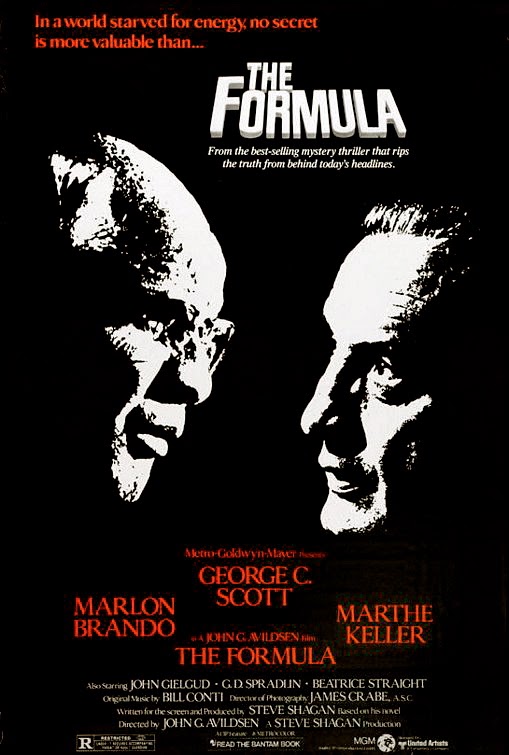While it would be
exaggerating to describe this conspiracy thriller as a massive waste of talent,
it’s fair to say that the luminaries involved in the project should have been
able to generate something more exciting. After all, stars Marlon Brando and
George C. Scott both had Oscars to their names by the time they costarred in The Formula, and director John G.
Avildsen had recently scored a major hit with Rocky (1976). Even the movie’s deep bench of supporting actors is
impressive: John Gielgud, Marthe Keller, Richard Lynch, G.D. Spradlin, Beatrice
Straight. Yet The Formula is talky
instead of thrilling, and the mano-a-mano faceoff between the top-billed actors
that’s promised by the film’s poster never really materializes. On the bright
side, The Formula is a
handsome-looking movie that benefits from intricate plotting and (no surprise) skillful
acting.
Written and produced by Steve Shagan, the picture begins with a
prologue set in Germany during the final days of World War II’s European action.
A Nazi general is entrusted with a shipment of valuable papers that Third Reich
officials hope to trade for protection after Germany falls, but U.S. soldiers
seize the shipment before the Nazi general can escort the papers to a safe
place. Next, the movie cuts to the present, where LAPD Detective Barney Caine
(Scott) begins investigating the murder of a former LAPD chief. Caine uncovers
connections between the dead man and oil magnate Adam Steiffel (Brando), and he
also links the dead man to various mysterious people in Europe. Despite skepticism
from his superiors, Caine treks to Germany and discovers that the dead man was
part of a conspiracy involving a World War II-era formula to convert coal into
oil. The ramifications are huge, since replacing petroleum as the world’s
primary source of fuel would change the global economic map. Intrigue follows
as Caine chases leads with the help of Lisa Spangler (Keller), a German model
whose uncle has a tragic connection with the conspiracy.
The premise of The Formula is interesting and workable,
so the problem with the picture is one of execution. Nearly all of Caine’s
investigative work takes the form of personal interviews, and there’s a numbing
repetitiveness to the way people get shot and killed by unseen assassins
immediately after giving Caine vital
information. Worse, since the hit men never seem to aim at Caine himself, there’s
not much real tension. By the time the movie climaxes in a lengthy (and
surprisingly casual) chat between Caine and Steiffel—one of only two scenes shared
by Brando and Scott—a general sense of lethargy has taken hold. Still, nearly everyone contributing to The Formula does solid work, from the way Brando hides his
character’s evil behind an avuncular façade to the way composer Bill Conti accentuates
scenes with robust flourishes. However, because the story never reaches a
boiling point, The Formula ends up
feeling like an episode from a well-made TV detective show,
albeit with fancier actors and more elaborate location photography.
The Formula: FUNKY


3 comments:
Peter, I thank you for being able to mention this on this site, because this movie reflects one of the curiosities of the Jimmy Carter Seventies, the push for "synfuels." Eventually someone realized "Hey, weren't the Nazis into synfuels?" Shagan apparently believed that such a formula actually existed -- it's hard to imagine so passionate a project otherwise. It's a shame, because oil from coal (which seems suggestive of our current obsession with shale) -- and pollution-free yet, according to the movie -- sounds like an even bigger fairy tale than "clean coal." Coming off the OPEC oil shocks, we were newly fascinated by our own oil economy -- note how handily an oil war explanation ended 1975's "Three Days of the Condor" -- and we were reading "The Crash of '79," a thriller about Saudi oil and an Iranian nuclear bomb, though the premise was that the Shah would build it. Just now as you were describing how lavish and stately and high-powered and yet unmoving this is -- despite Brando as Steiffel lustily declaring "We ARE the Arabs!" -- I recalled another project, sadly just a little outside your scope: 1981's "Rollover," starring Jane Fonda and Kris Kristofferson, an attempted financial thriller (now there's a difficult genre) about the hazards of our dependence on Saudi billions. It was the issue of a decade, and Hollywood kept trying -- and kept failing. It's a shame.
And those two Oscars of Scott and Brando, which you completely fail to mention,
were infamously and courageously rejected by both of them, a gesture of iconoclastic contempt towards The Academy and The Great Golden Icon that remains unsurpassed by any other actor or actress to this very day. Now if Olivier had been in this, that would been quite historic, despite any other qualities it might have possessed, either good or bad.
“Synfuels”, interesting. Not only am II obsessed with 70s films and books, I am also obsessed with 70s radio. I recently found a Rick Dees radio show from 1979 where a news reporter mentions “gasohol”. I hadn’t heard that term in probably 40 years! I’m assuming that was a “synfuel” as well. As the first commenter mentioned, the Carter era was indeed full of odd thrillers (books, film, TV) that had oil, nukes, shady media companies, etc as major plot elements. I remember my folks going to see “Rollover”. Surprised nobody made a Skylab movie!
Post a Comment